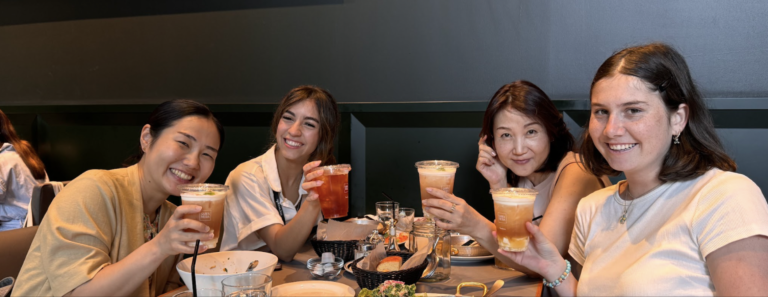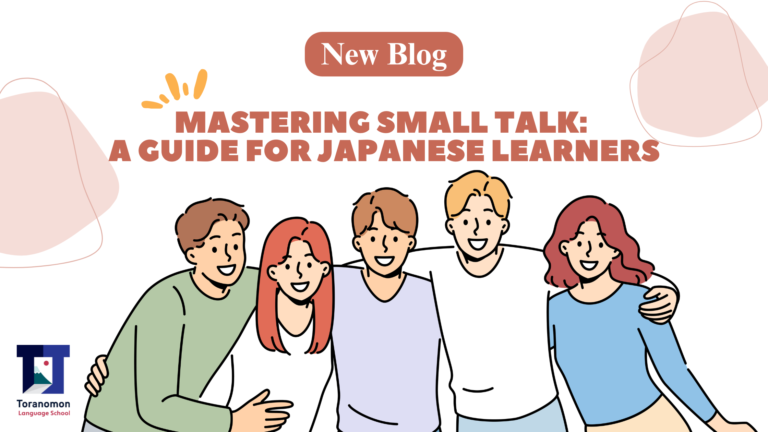At Toranomon Language School, we are committed to providing more than just language instruction. Our approach includes teaching intercultural differences and practical Japanese that you can use in real-life situations. One essential aspect of effective communication is mastering small talk, which varies significantly across cultures.

Cultural Differences in Small Talk
Understanding small talk is crucial for making meaningful connections, and it varies greatly between cultures.
In Japan, the norms for small talk can be quite different from those in other countries. For example, in many other cultures, it’s common to strike up conversations with strangers in various settings, such as elevators or queues. However, in Japan, it is sad that people are less common to interact in such situations and that they often prefer to maintain a more reserved demeanor in public spaces. This cultural preference for privacy means that initiating small talk with strangers might be seen as unusual. However, in reality, you see Japanese people enjoy small talks. How do we do it??
When it comes to discussing personal topics, Westerners often ask questions like “How was your weekend? What did you do?” as a way to build rapport. In Japan, we teach that such questions can sometimes be perceived as intrusive if you don’t have a close relationship with the person. Instead, commenting on the weather—such as “It’s so hot today”—is a more common and comfortable way to engage in small talk, especially when you’re not yet familiar with the person.

Common Small Talk Topics
Here are some common small talk topics and their cultural variations:
- Compliments: In Japan, we tell learners that compliments like “I like your bag” or “Your nails look great” are generally reserved for people you know well. In contrast, Western cultures might use such compliments even with people they’ve just met. Understanding this difference can help you navigate social interactions more smoothly.
- Weather: Discussing the weather is a safe and universal topic. In Japan, talking about the weather is a common way to start a conversation, especially with people you don’t know well. Phrases like “It’s so hot today” or “It’s raining a lot this week” can help break the ice without delving into more personal topics.
- Food and Drink: In many cultures, discussing food and drink can be a pleasant small talk topic. In Japan, comments about food, such as “Have you tried the new sushi place nearby?” can be a good way to engage in conversation. However, be mindful of how personal preferences are expressed, as direct critiques might be taken differently.
- Events and Activities: In Western countries, people might discuss upcoming events or activities they’re looking forward to. In Japan, while it’s also okay to talk about events, it’s often more common to discuss local happenings or festivals in a more general way rather than personal plans.
What to Avoid in Small Talk
While mastering small talk, it’s equally important to know what to avoid to prevent any discomfort or miscommunication:
- Personal Questions: Avoid asking overly personal questions, especially when you don’t know the person well. Questions about income, marital status, or personal health can be seen as intrusive. Instead, stick to more neutral topics unless you have a close relationship with the person.
- Sensitive Topics: Be cautious when discussing sensitive topics such as politics, religion, or personal beliefs. These subjects can be contentious and might make the conversation uncomfortable. It’s best to steer clear of these unless you’re certain the other person is comfortable discussing them.
- Negative Remarks: Complaining about something, such as the weather, traffic, or work, can put a negative tone on the conversation. Even if you’re frustrated, try to keep the conversation positive and lighthearted.
- Overly Familiar Behavior: In Japan, being overly familiar with someone you don’t know well can be off-putting. Avoid using informal language or making overly familiar gestures, as this can come across as disrespectful.
Practice What You Learn

To help you apply these small talk tips in real situations in Japan, we’re excited to invite you to our “Meet & Mingle” event on September 25th from 6 PM to 8 PM at WeWork Toranomon. This event is an excellent opportunity for you to practice these small talk skills in a friendly and relaxed environment.
At the “Meet & Mingle,” you’ll have the chance to engage in small group discussions organized by Japanese language level. Whether you’re a beginner or an advanced speaker, you’ll be able to practice these tips and connect with others in a supportive setting. This event is designed to help you feel more comfortable in social interactions and enhance your understanding of Japanese cultural nuances.
By learning and practicing these small talk strategies, and knowing what to avoid, you’ll be better prepared to navigate social interactions in Japan and make the most of your experiences here. We look forward to seeing you at the event and helping you develop your communication skills in a fun and interactive way!
If you’re joining us, please fill out the form to RSVP and let us know you’re coming!
Other courses:
For adults looking to become bilingual and learn Japanese, check out our One-Month Leve-up Intensive Japanese courses now available morning and afternoon with special coupon you can find below here at Toranomon Language School where we prioritize your learning on application rather than just input, in a motivating and comfortable environment. Join us in our one month course to learn essential Japanese customs and language. We also provide networking events occasionally so you can connect to new people you are interested in.
Our twice a week casual course for adults focuses on conversation so you can speak confidently in just one month. Make your life easier by learning practical Japanese phrases and learning how to engage in basic conversations.
Our adult private Japanese classes are offered for all levels. Whether you are beginner, intermediate or advanced, we provide high-quality and flexible courses with a wide range of content adjusted for your learning needs. Whether it be industry-focused, task-focused, or casual conversation, we the classes are totally purpose-oriented so the learning is fast!
For kids we offer our after-school Japanese that is student focused with customized lessons. Your child will develop critical thinking skills, fast reading and listening comprehension skills and increase scores on the JLPT exam along with much more. This course is perfect for pre-school and elementary students.
Any questions? Feel free to contact us.


